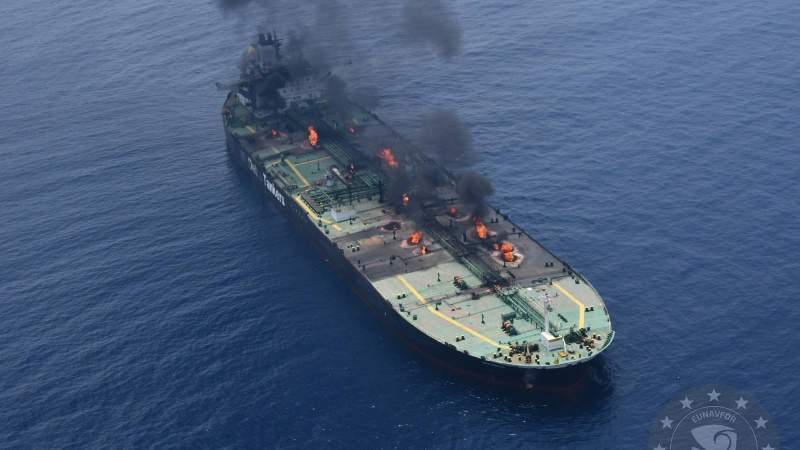Israeli Foreign Minister: What the Yemenis are Doing in the Red Sea Exceeds Imagination

News - Middle East: The Israeli enemy has once again acknowledged the growing concern over the Yemeni support front for Gaza, expressing shock at the threat the Yemeni Armed Forces have posed to the security of the Israeli entity over more than a year. This threat continues to evolve, with all attempts to contain or eliminate it proving unsuccessful.
According to Hebrew media, the Israeli Foreign Minister spoke at a conference for the Organization for Security and Cooperation in Europe last Thursday, saying, "What the Houthi state is doing with maritime transport in the Red Sea is unimaginable."
He added, "It is hard to believe that the international community is unable to impose the global order on them."
This statement represents the latest acknowledgment of the shock and despair within the Israeli leadership regarding the effectiveness of the Yemeni support front. The attempts to conceal its impacts have clearly failed, especially in light of the failure of international powers that Israel relied on to contain and remove the Yemeni threat.
The impact of the Yemeni operations extends beyond maritime actions. On Friday, Maariv reported on the remarks of the head of the Israeli Air Defense and Reconnaissance Unit, referred to as "Colonel A," who admitted that the threat posed by the "Houthis" was not anticipated before the war.
He said, "We were surprised by the capabilities of the Houthis. We did not consider them a threat before, we didn’t develop capabilities against them, and we were unprepared to confront them."
He pointed out that "the Houthis have not hesitated to target Israel's vital civilian infrastructure, including the seaports in Ashdod, Haifa, and Eilat, and the gas platforms."
He continued, "They have launched over 300 targets at us since the war began, killing one person in Tel Aviv."
He added that Yemen and Iraq "aimed to harm our maritime trade, cripple the country, and damage military camps and major cities. They are trying to harm our national infrastructure."
The Israeli colonel, described as "responsible for protecting Israel's airspace," acknowledged that drones represent "a new and unprecedented threat" for the Air Force.
He explained that drone threats pose a difficult challenge on a global level. To counter drones, he said, "We need a detection system that scans 50 meters above the ground, as drones fly at low altitudes and use the terrain, flying over roads at low speeds. We need to know how to distinguish between a vehicle and an intercept target," adding that "one breach is enough for the public to feel that we have failed."
The Israeli officer also stated that the monitoring cell faces significant mental challenges in dealing with drones.
These military statements offer further confirmation of the difficulties faced by Israel in dealing with the Yemeni support front. The acknowledgment of failure and shock regarding the Yemeni threat is not limited to maritime operations, which the US and the West have failed to stop, but also extends to direct missile and drone attacks, as well as joint operations between the Yemeni Armed Forces and the Islamic Resistance in Iraq. This suggests that all the fronts Yemen is engaged in are successful and effective, and Israel continues to struggle with them over a year later.
These acknowledgments break through the censorship and silence imposed by Israel's media on the effects of Yemeni support for Gaza. The statements from the Foreign Minister and the head of the Air Defense Unit reveal many key points, confirming that the Yemeni front remains a growing security, economic, and strategic problem for Israel, even if these impacts are not publicly disclosed.
Since the onset of the Israeli regime’s war on Gaza on October 7, 2023—after Palestinian resistance movements launched Operation Al-Aqsa Storm—Yemen has declared unwavering support for Palestine’s struggle against occupation. The Yemeni Armed Forces have launched regular strikes against Israel as part of a phased escalation campaign.
This campaign has included a strict maritime blockade of Israeli shipping, effectively preventing vessels from reaching Israeli ports. In the initial phase, Yemeni forces targeted the port of Umm al-Rashrash in southern occupied Palestine. This escalation marks the culmination of a year-long series of actions across five phases.
Yemeni military advancements have now enabled strikes deep within Israel, reaching Jaffa (referred to by Israel as Tel Aviv) and other key locations. These attacks have utilized hypersonic missiles and advanced drones with significant destructive capabilities, targeting ports and critical military infrastructure throughout occupied Palestine.
#Yemen #Israel About 1 month
-
09:58
Enemy media: Yemen has launched around 40 surface-to-surface missiles, 320 drones towards "Israel" since the beginning of the war.
09:34
The Ministry of Foreign Affairs reaffirms readiness for a full prisoner exchange, urging action based on the "all for all" principle.
09:34
The Ministry of Foreign Affairs condemns Israeli Prime Minister Netanyahu's threats to target Yemen's infrastructure, calling it an act of terrorism.
09:33
The Ministry of Foreign Affairs: Non-Yemeni forces in Yemeni provinces and islands are labeled as a complete occupation, deemed unacceptable
09:33
The Ministry of Foreign Affairs accuses Riyadh of worsening Yemeni citizens' suffering through the puppet government in Aden as part of plans for international conflict.





